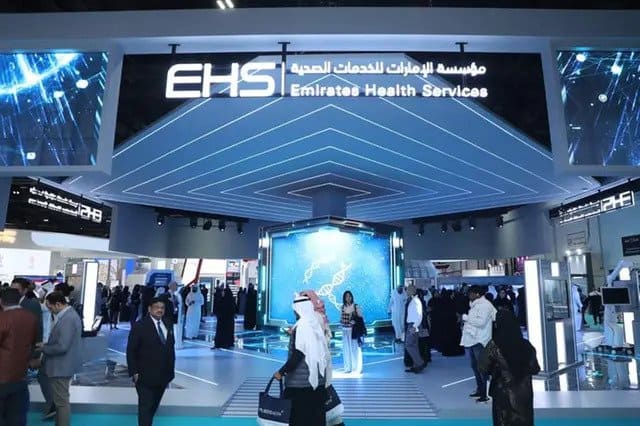Dubai, UAE – Emirates Health Services (EHS) has launched the ‘Microbubble Treatments for Children’ programme – the world’s first non-surgical programme of this kind – along with two other breakthrough projects on day one of the Arab Health 2023.
EHS is taking part in the event under the theme ‘Shaping the future of healthcare’, with a series of projects grouped into three main axes: Innovative and Sustainable Health Services, Advanced Healthcare Technology, and Artificial Intelligence (AI) and Preventative Forecasting.
EHS announced the Robotic Spine Surgery Suite project, in addition to three advanced technologies that Al Qassimi Hospital is the first institution in the middle east to have implemented, namely, the Cardiology Services project, which offers the latest wireless pacemakers, the Altron platform, and the Coroventis CoroFlow platform.
“Emirates Health Services is participating in this year’s edition of Arab Health with a range of breakthrough healthcare projects being revealed for the first time,” Dr. Essam Al Zarouni, Executive Director of the Medical Services Sector at EHSsaid. The exhibition offers a key platform for highlighting our role in strengthening the healthcare sector and shaping its future with our innovative medical projects and programmes, available across our various facilities”.
‘Microbubble Treatments for Children’ programme research project is being pursued in partnership with the Children’s Hospital of Philadelphia. The project aims to administer various treatments through microscopic bubbles that moves in the bloodstream to reach the target areas as needed.
The programme can be used in the treatment of traumatic brain injuries, where an inert gas is carried in the microscopic bubbles to the target area of the injury, and then sound waves are used to drive the bubble through the blood-brain barrier and release the gas, relieve the bruise, and reduce swelling.
Microscopic bubbles injected with an intravenous dye also contribute to the diagnosis of stroke by targeting areas of ischemia and measuring brain pressure in a non-invasive manner. The direction of the movement of the bubbles is related to the areas of ischemia to be treated, as they are evaluated at the same time. Gene therapy is one of the most recent uses of these bubbles, where they are used to transport viral carriers that transfer modified genes to the target areas.
Robotic surgeries
The second project is The Robotic Spine Surgery Suite, allows for the use of robotic imaging and surgical planning using the robotic arm, the Loop-X Mobile Robotic Imaging device, and artificial intelligence (AI) techniques for surgical planning which is the first of its kind in the world. and serves to provide high-resolution images, a smart navigation system, and data processing.
Cardiology services
Emirates Health Services announced three innovative smart projects being applied for the first time in the Middle East. The first of the projects consists of advanced wireless pacemakers placed under the skin, which helps patients lead normal lives.
Meanwhile, the second technology – the Altron project – provides next-generation endovascular imaging and coronary physiology software on a single platform to guide clinicians through the percutaneous coronary intervention (PCI) procedure, provide precise guidance to determine the appropriate pre-catheterisation treatment plan, and ensure accurate stent sizing results.
And lastly, the third technology is the Coroventis CoroFlow project, which consists of an advanced platform for measuring cardiac physiological indicators, such as partial flow reserve to assess the heart vessels, and the coronary flow reserve and microcirculation resistance index, in order to assess microcirculation. The Coroventis device is the only piece of equipment capable of diagnosing cases of angina pectoris resulting from diseases of the capillaries of the coronary circulation.








